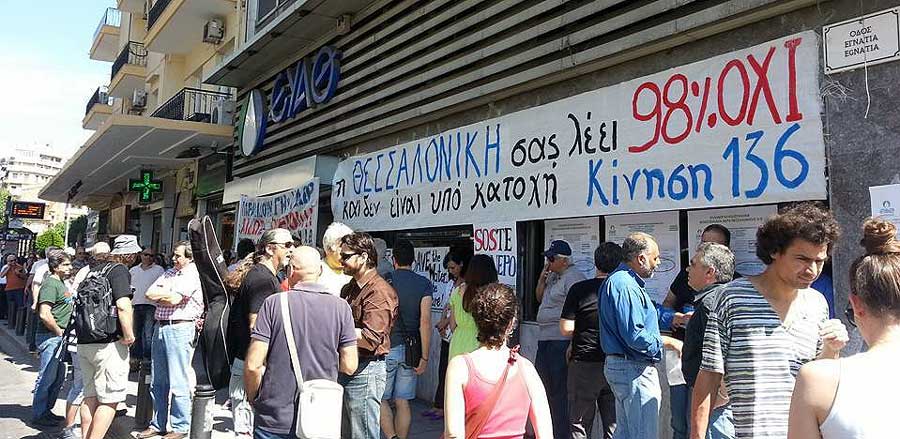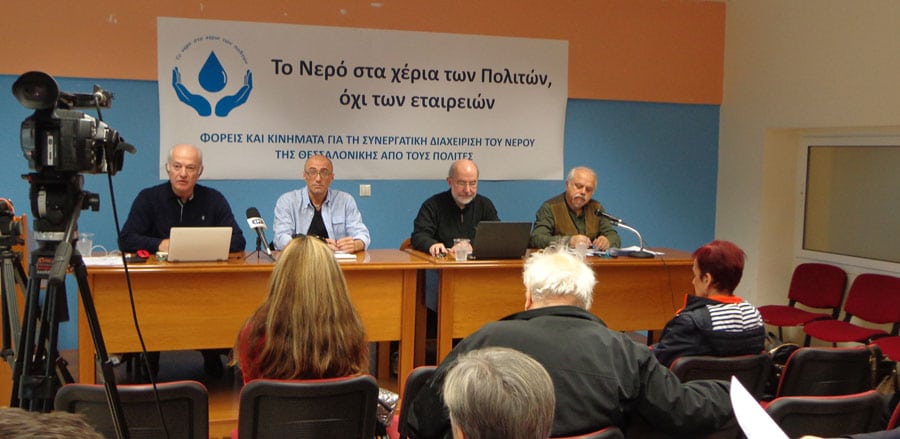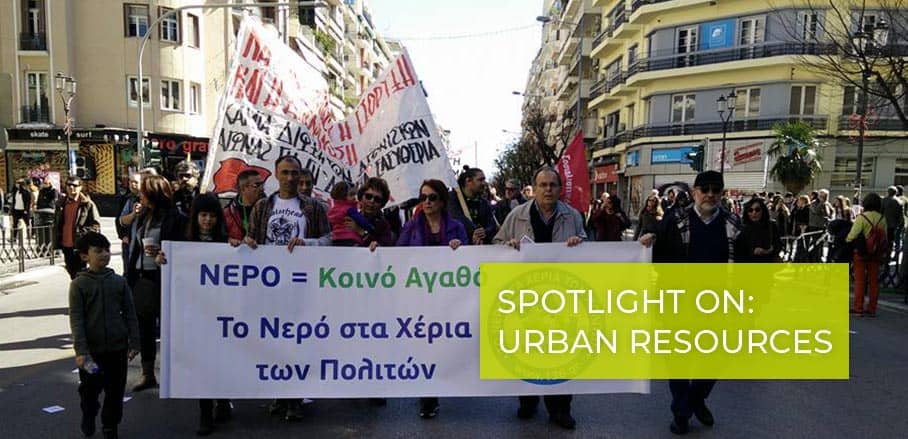Cooperatively Recovering Water as an Urban Common
Water as a common resource that no one should derive profit from – an idea that stands in crass contrast to privatising urban water management. Kostas Nikolaou, professor and activist with the Greek water movement K136, portrays their successful fight against privatisation.
Whether a city approaches and recognises water as an urban common, as a commodity, or as a means for taxing citizens determines the management policy: private, public, social, based on democratic citizen participation or not. The results of the private management of water, which is applied worldwide, are well known: degradation of water quality, increased water loss, deterioration of infrastructure, and increasing prices. Also known are the results of the public or social or public-community management, based on cooperation between public and local and regional bodies, cooperatives, trade unions and other collectives of a community: accomplished citizen involvement, strengthened quality water services, and lower prices.
A Historic Referendum in Thessaloniki, Greece
The referendum on the privatisation of EYATh (Thessaloniki’s water and sanitation company) held in Thessaloniki on 18 May 2014, is a golden page in the history of the city. 218,002 citizens went to the referendum polls in 181 polling centres supported by 2,000 volunteers, and with a percentage of 98 per cent answered “No” to water privatisation. The number of citizens who participated in the referendum in relation to that of citizens who participated in the local elections (held during the same day) exceeded 51 per cent.

© K136
Citizens, water movements, local government and workers, all together in a great alliance of NO, gave a resounding response to those who attempted to privatise water. It was a great event, which marked Thessaloniki in the world map of the fights for water.
After the Referendum
The water movement K136, represented in the five-member central committee organising the referendum, decided on a strategy of transforming the “Alliance of NO” into an “Alliance of YES”. K136 considered it the right time to develop a positive proposal. Reaching for the support of a majority of society, this could be an articulation of local and/or municipal/regional government management of infrastructure and water sources. The model would include cooperative ownership and management of water supply and sanitation entities, ensuring the participation of local communities and of workers in the entity’s management.
For the character and future of the water movement, K136 considers that it should be direct democratic, independent of political parties and other organisations, ecological, and in view of the social solidarity economy: no one should derive profit from the common resource water, but exclusively ensure provision to all citizens in terms of social justice.
The “Silent Revolution” of the Water Cooperatives
Water cooperatives are not an isolated localised phenomenon. On the contrary, they thrive in countries with various environmental and social-political-economic conditions, indicating their adaptability. Thousands of examples of urban or rural water cooperatives exist in the USA, Canada, Latin America (Chile, Colombia, Brazil, Argentina, Mexico, and Bolivia) and Europe (Finland, Denmark, Austria, et cetera). Moreover, water cooperatives have won high marks for customer satisfaction and operational performance worldwide.
The international financial capital promotes the private or public-private management of water, loyal to the neoliberal fundamentalism, although even its own researches show the advantages of cooperative models. Very characteristic is the outcome of a World Bank research: “Consumer cooperatives can offer an alternative institutional model for delivery of urban water supply and sanitation services. The cooperative model has a number of potential advantages over private and public utility models. All utility cooperatives are characterized by the facts that owners and customers are the same and that cooperatives do not have a profit objective. The ownership model and governance structure can result in a clear objective for the utility: provide sustainable service at affordable cost. The fact that any cost reductions are translated into lower tariffs constitutes a strong incentive to pursue efficiency”.
Despite the significant number of thousands of successful water cooperatives globally, international policy discussions have largely bypassed them. Furthermore, water cooperatives have been largely ignored both in research and policy. The discussion has focussed on private and public water and sanitation systems, ignoring community-based options.
Why?
Because the water cooperatives constitute an alternative model for the water management aside from the public (governmental or municipal) and private model, they are created and operated “from below” on a non-profit basis, they are independent from economic and political interests, they ensure the most possible democratic citizen participation and they do not leave a distinct position for bosses of private and public sector. Are these not good reasons to conceal them?
“The Future Belongs to Those Who Prepare for it Today”
On March 2018, 54 organisations, cooperatives, and movements for the cooperative citizen management of the Thessaloniki water signed a declaration stating: “We propose the internationally proven, most successful water management model with primary non-profit water cooperatives in each water-borne municipality of the city, whose Union will manage the EYATh of citizens, workers, and municipalities in order to provide high quality water with low prices, environmental protection, democratic functioning, and social justice. We jointly open an invitation to the citizens of Thessaloniki, to the movements, the local government and the social organisations of the city, to jointly claim the management of the water of Thessaloniki by the citizens and the local community”.

© K136
It is a proposal to situate municipal water management within the social and solidarity economy and direct democracy, aiming for a society and economy of needs and not of profits, in a society where the free development of everyone is the condition for the free development of all.
- Cooperatively Recovering Water as an Urban Common - 7. April 2020
